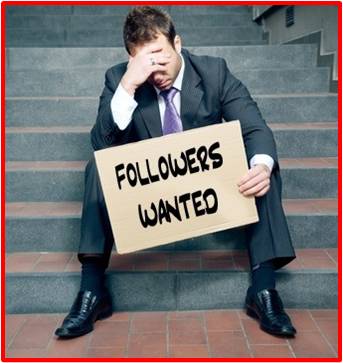 I have read quite a few articles and blogs lately from business coaches who advocate that you should spend money to get “likes” on your business page in Facebook and followers on other forms of social media. With all due respect, this is by far the most foolish and financially irresponsible strategy I’ve ever heard of. If your coach or advisor is telling you to do this, you need to need to understand that there are at least 3 good reasons why you should NEVER do this:
I have read quite a few articles and blogs lately from business coaches who advocate that you should spend money to get “likes” on your business page in Facebook and followers on other forms of social media. With all due respect, this is by far the most foolish and financially irresponsible strategy I’ve ever heard of. If your coach or advisor is telling you to do this, you need to need to understand that there are at least 3 good reasons why you should NEVER do this:
- While it is nice to have people like your page, you need to think about what the end game is. Likes don’t put money in your bank account and food on the table for your family. What you really need in your business is a good steady stream of qualified leads who are ready to pay you for your solution. Likes are not leads. They may like your page one day and never return or pay very little attention to the posts on your Facebook page.
- Facebook has recently changed the way their ads work (yet again) for posts on your business page. Even if you have thousands of followers, you must now pay to talk to them. In the old days, you could send messages and your posts were given priority in the newsfeed of your followers. Not anymore. Now, you must pay to promote each post you make or virtually no one will ever see it (no matter how many likes you have). With Facebook, you must pay to acquire the likes AND also pay to speak with them.
- When you send traffic to your own website and they give you permission to contact them, you are building the most important asset in your business: your list. Your list allows you to build a relationship with prospects and customers and it also buys you time to present your claim, solve their pain and prove that you can do it. Once you own your list, speaking to them is virtually free. No matter what, you have this list and it is always the most cost effective way of building your business. If someone else, like Facebook or any other social media site, owns your list, then they control how, what and when you can communicate – and how much you must pay to do it. If Facebook went off line or out of business, what would happen to the so-called list of followers you paid dearly to acquire?
As a small business can you really afford to buy likes on social media or should you spend your time and limited marketing budget on generating qualified leads who will pay you for your solution?
The most successful brands in the world don’t waste their money on likes. Instead they focus their time and money on influencing and persuading you to buy their solution. They know exactly how to push the “buy button” in your brain and they do it successfully over and over again.
They have ALL mastered 1 simple technique and they secretly hope that YOU will never discover what it is. As a small business owner, they currently have an unfair advantage over you but that is about to change… In my free online event on December 6th, 2012, I will reveal why this 1 technique is so damn effective and how you can use it to instantly influence and persuade your customers.
“With great exposure comes great responsibility.”
Without a doubt, social media marketing is the great equalizer. Until the arrival of WordPress, Facebook, YouTube and Twitter, big business had an unfair advantage. Any business could of course create a website but few had the resources and knowledge to capture global exposure and sales.
Most SMEs had to settle for direct mail, local newspapers, networking, pay-per-clicks etc. because they simply could not compete with the big budgets of the big brands. In most cases, the advertising mediums with the biggest reach and frequency – TV, radio, online banner and outdoor – were out of the grasp of the average small business.
Social media marketing changed all of that.
With social media marketing, anyone can create an online presence and broadcast their uncensored views or talent worldwide, for less than $500. People like Justin Bieber and Lily Allen went from middle class obscurity to millions of fans and multi-million dollar careers virtually overnight due to social media.
Neilson published stats show that the world now spends over 110 billion minutes on social networks and blogs. What this means is that you, I and your prospects now spend 25% of our time (around 12-15 hours a month) visiting these types of sites. And unlike the consumption of other types of media, social media is doubling year on year, it’s inexpensive and it’s now available 24/7 on mobile devices.
And therein lies the problem.
Good and bad news, whether true or untrue, can spread online like an epidemic. As opposed to advertising (which is initiated by you), a large percentage of what is said in social networks (and social media marketing) is contributed by people outside of your organization. How do you keep track of every single thing that is said or written about you? It’s almost impossible to monitor and control where and how your brand is mentioned online.
That’s why social media marketing has the potential to boost your reach and sales exponentially, but it could also easily bring out the worst in your company. With this in mind, what do you need to consider and do in your business to mitigate the risks?
1. Social media marketing is for social interaction
The focus of traditional marketing and advertising is on lead generation and sales. However, in social media marketing, it’s all about engaging with others, exchanging information and creating relationships. In order to excel in the realm of social networks, you will need to offer value upfront (to gain followers) and then focus on getting to know them and understanding their needs.
Prospects and customers are more interested in the interaction they have with you than they are on the deals or special offers. If you don’t engage with your followers on their terms, you risk doing more harm to your brand than good. Think of how many people and businesses have asked you to “like” their brand, re-tweet a message or join their mailing list in the past 24 hours? We are inundated with brands talking at us in social media and it is getting harder to create an impression and persuade us to act.
2. Look for opportunities to turn around customer experiences
You will discover more in one week about your brand in social media marketing circles than you will find in a year of traditional research. People don’t censor their opinions when they share with their friends and you are likely to hear a lot of stories of how you have fallen short of expectations. All of this is a very good thing because it means that you have a direct opportunity to make it right. Of course, you have to be listening and you need to have a strategy on how you will deal with it. In the absence of these 2 things, you are actually worse off because the story will spread like wildfire and it will carry a much greater weight since it is shared among friends.
Most will mistakenly view social media marketing as a great place to sell more stuff. It is actually a far better place to listen to what your customers are saying and take action to turn bad experiences into positive ones.
3. What is it really costing you?
On the face of it, social media marketing appears practically free. However, when you factor in the time it takes to produce content across various mediums, cross- promote it, reply to followers etc., it could easily turn into a full time job. Your time (or the time of a team member) is valuable and needs to be measured against the returns generated by the online activity. Return on investment online is a function of both tangible and intangible factors.
In my experience, far too many small businesses are getting caught up in the hype of social media marketing without a clear understanding of the real cost or return. Why spend hours a day posting and interacting online if you can generate a better response by speaking directly to your customers or asking for a referral? Social media marketing only promises you can talk to more people for less money, it doesn’t guarantee that anyone will listen or that you will earn the same return on investment that you could receive elsewhere.
4. Be clear about your brand and branding strategy
Prospects often need to see the same message many times before they will decide to take action. One of the biggest mistakes that you can make is to overload your audience with too many messages because you are trying to be all things to all people. Repetition is the key to retention. In order to be remembered and acted upon, your message should be consistent across all channels including your social media marketing. This means that wherever your prospects and customers see you, they have to experience your brand and your message in the exact same way. This can become difficult when you are trying to manage multiple platforms and respond to what is happening in real time.
It pays to have a very clear strategy before you embark on social media. Social media marketing is not like traditional advertising channels – it is very fluid and dynamic. As such, circumstances can change on a daily basis and you need to outline ahead of time what your key messages are and how they should be communicated consistently to your audience.
5. Social media marketing is not for everyone
Who manages your social media marketing? If it is not you personally, does that employee or part-time contractor understand what your plan and overall strategy is? In many cases they may be the most direct links to your target market and everything that is said by them on your behalf will have far reaching implications for your brand and company.
If they are responding to a disgruntled customer or worse, an insane person who is just trying to create trouble, do they know exactly what to do to diffuse the situation? If the situation gets out of hand, at what point do you find out and become involved? Do you have the means to take action and protect your brand if matters get out of hand or you become the target of defamation?
The reach and potential of social media are great – so are the risks. While it may seem harmless and fun on the surface, the capacity to do irreparable harm to your brand is very real. Social media marketing needs to be entered into with a very clear plan. It’s not something that you should delegate freely or allow to run unmanaged.
Start first by monitoring what is said about you and your brand online. There are many free services online which can assist you to do this. Take some time to investigate what your competitors and other well known brands are doing in this space. Then, once you understand the key platforms and what you hope to gain on each by participating, you can begin to create a community of followers with confidence, control and safeguards.










